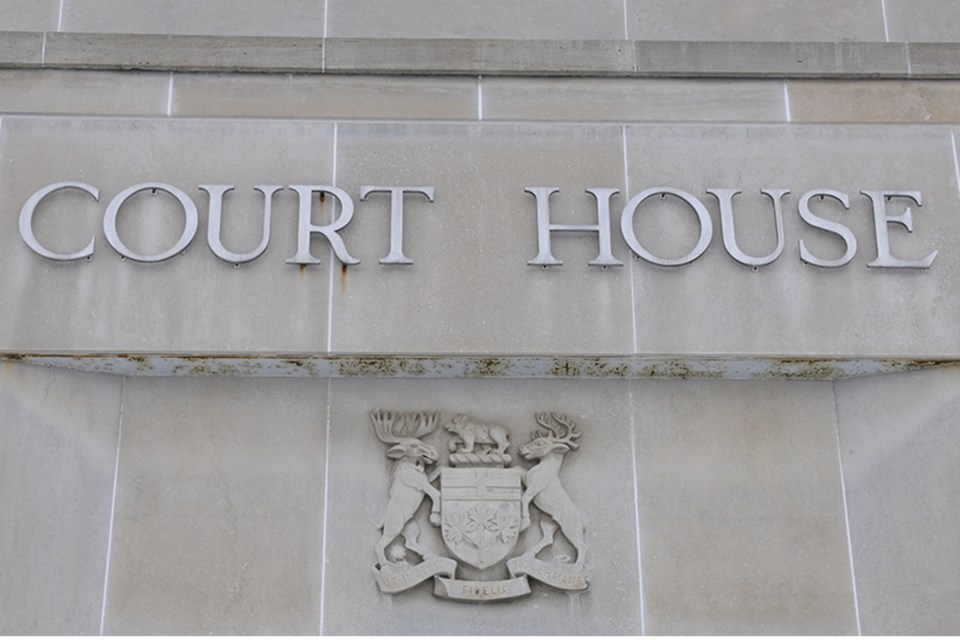The trial of a Sudbury man charged with human trafficking came to an end in provincial court on Feb. 26, with closing submissions following the testimony of one final Crown witness.
A decision date has yet to be set. There is a publication ban on testimony from the alleged victims, as well as their identities and any details that point to their identity.
Paul Castonguay is charged with trafficking in persons under the age of 18; receiving a financial or other material benefits – derived directly or indirectly from the trafficking of a person; procuring; material benefit from sexual services; assault causing bodily harm: chokes, suffocates or strangles; two counts of assault; indecent acts; possession of property obtained by crime (under $5000) and breach of undertaking.
At trial today, defence attorney Dennis Michel told Justice Pierre Bradley that his client wished to concede guilt on the charge of indecent acts. A video showing Castonguay exposing himself to the public was offered as evidence at his last appearance on Jan. 3.
Castonguay’s trial has been postponed several times, with the Dec. 17 adjournment prompting Bradley to say to the court: “it is entirely the defendant’s fault.”
When it came time for the first witness in court today, Michel objected several times, first to the witness's virtual appearance, which he said he did not agree to, as well as the nature of the “hearsay” evidence he felt the witness was offering.
Bradley allowed the witness to testify by Zoom with camera on, and assurances that the witness was alone during their testimony.
After the final witness today, the assistant Crown attorney Mathieu Ansell rested his case.
Michel for the defence called no witnesses on behalf of Paul Castonguay before resting his case.
In his submissions, Ansell spoke of this testimony and the alleged accuser’s testimony, summarizing the accusations against Castonguay. (Again, these details are covered under a publication ban.)
In Castonguay’s last appearance, Jan. 3, the court heard from an alleged victim of Castonguay, as well as Det-Cst. Stephen Bradley, the lead investigator on the case.
He said that early interviews with the alleged victim, while they were still involved with Castonguay, did not yield much information, but when he considered the “constellation of information he received,” he felt it necessary to continue to interview the alleged victim.
The detective suggested that the reason the alleged victim‘s interview elicited more information as time went on was a reflection of Castonguay’s loosening hold, and that the alleged victim did not make accusations until she was “not a victim and not being held against her will.”
Upon cross-examination, defence attorney Michel accused the officer of “planting the seed” of trafficking in the alleged victim's head and that Bradley was making his investigative choices based on a “morality issue, not a police issue.” Michel said the police prosecution of this case was based on a police narrative, rather than a crime.
But this was the focus of Michel’s final submission as well, whether this was a case of police making their decisions based on their “morals” rather than the law. In fact, he called his own client “disgusting,” and suggested that the police may have found him “repugnant” but that those feelings did not add up to “evidence beyond a reasonable doubt.”
Michel noted discrepancies in the testimony from the accuser regarding times, dates and witnesses to the events described and suggested the alleged victim had multiple opportunities to leave the situation of their own free will.
He also suggested again in his closing submissions that the police and the alleged victim’s parent had been “grooming” them or coercing them into believing they were trafficked.
“I’ve seen it in police work before,” said Michel, “particularly with children.”
Michel, in his closing statement, asked Bradley “set morality aside, is there evidence beyond a reasonable doubt?”
Castonguay will be in assignment court on March 6 to set a date to hear the judge’s decision.
Jenny Lamothe is a reporter at Sudbury.com.
